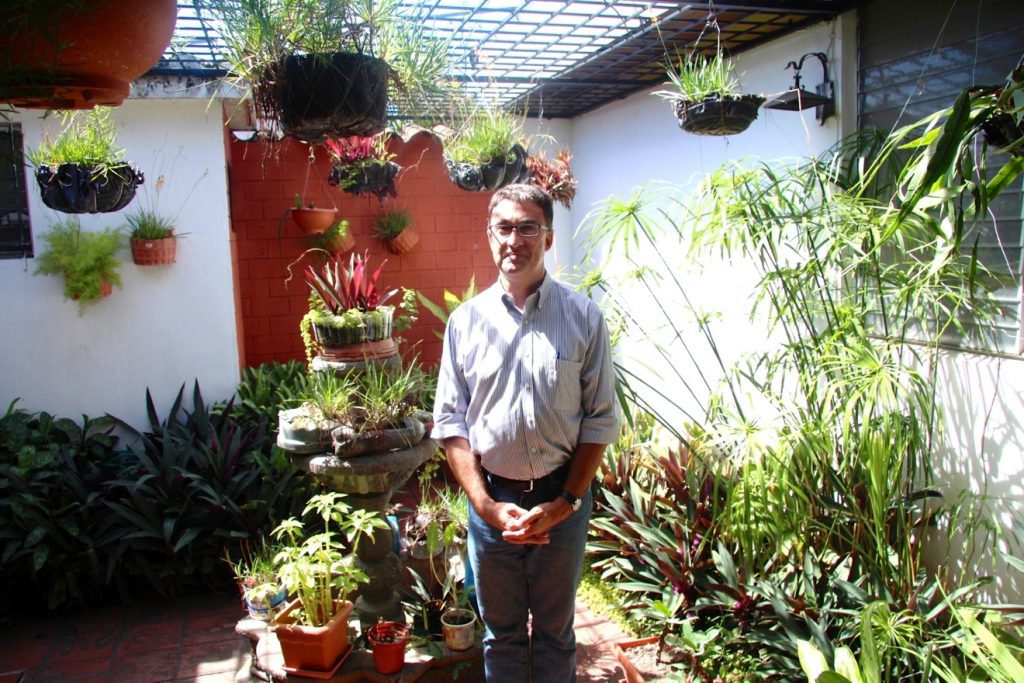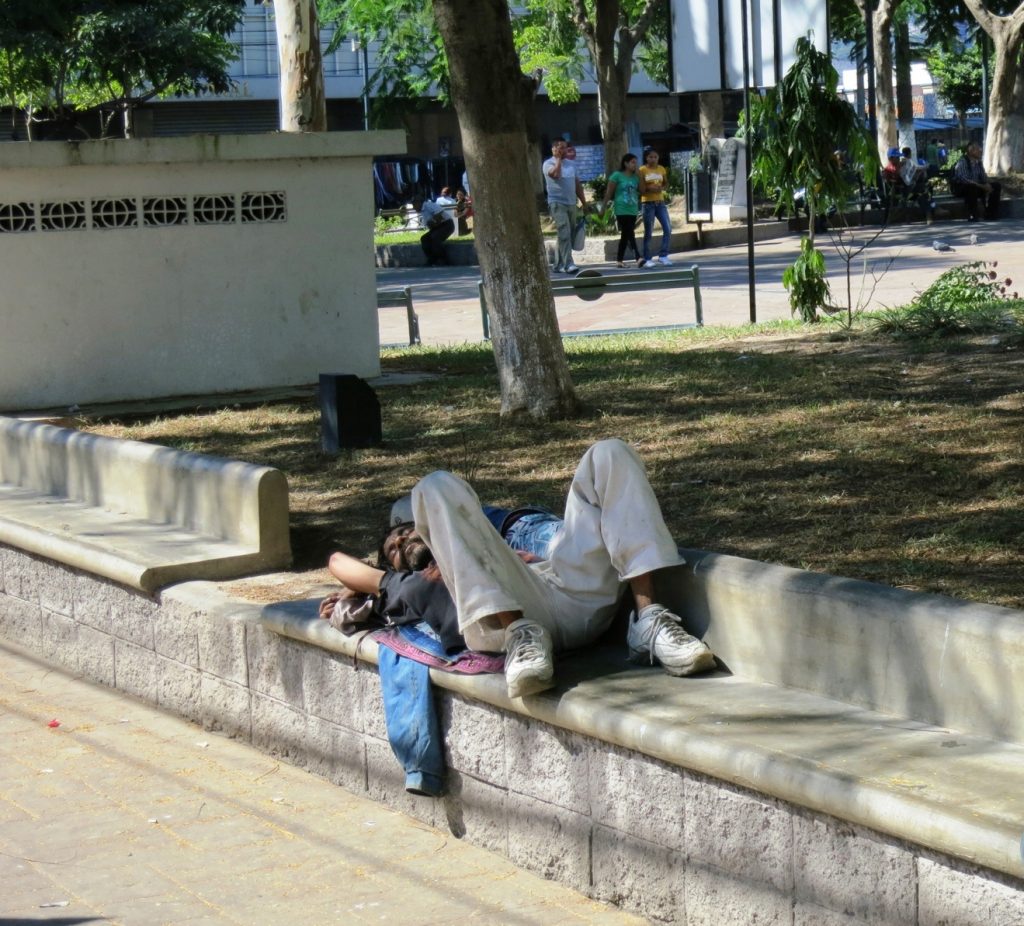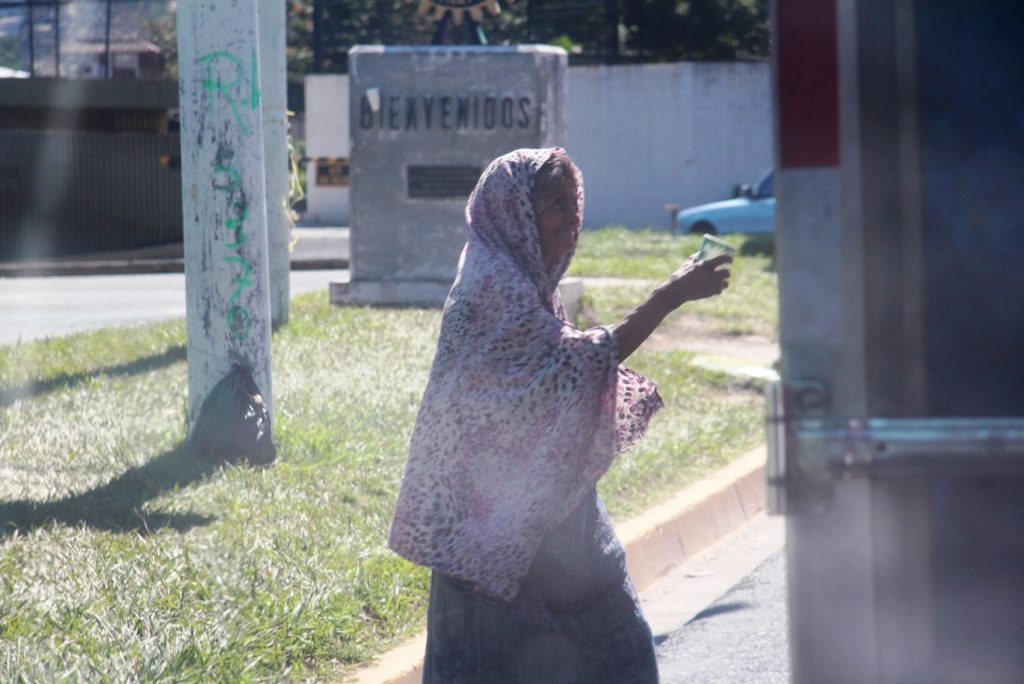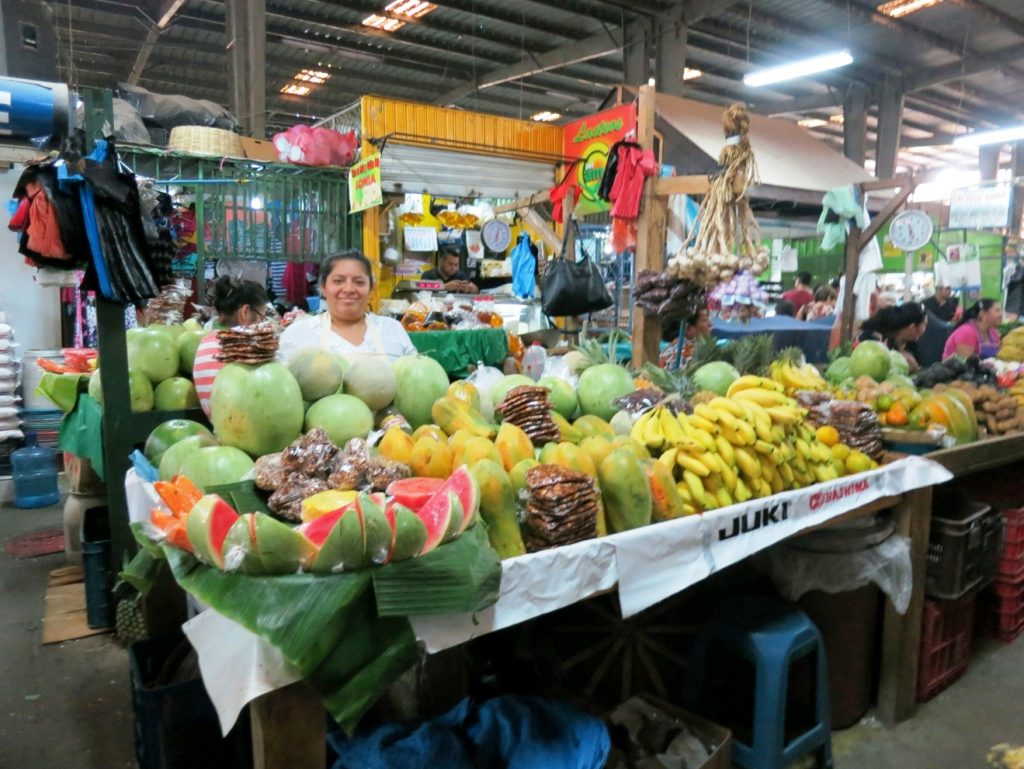JOE HASTINGS
Esta historia se escribe en Español = This story is also written in Spanish here.
“I wanted to be involved in people’s lives and involved in an empowered laity.”
Editor’s Note: Time flew by quickly as we interviewed this light-hearted yet serious Joe. Or was he interviewing us? With Joe it’s hard to tell. He is a spitfire of a personality. We were in hysterics laughing at some of his off-the-cuff first answers to our questions, only to be followed by the very serious answers. Joe, you see, is devoted and committed to his role as a Maryknoll missioner. After volunteering, working, and teaching religion in the States for many years, he felt called to leave behind a comfortable position in California in order to stretch and challenge himself to empower people living in community in El Salvador.

I was the youngest of eight kids in our family. After me my parents bought a TV (he laughs.) We kids thought we were a strange family and were self-conscious about being different from our neighbors. In a large family you learn to make much out of a little.
When I was six, my dad bought a van from a Navy surplus auction, and after adapting it for our needs, the ten of us spent three consecutive summers traveling on six-week camping adventures in it. It was a Lord of the Flies situation of survival. I learned how to pack for six weeks in a quarter of a Navy trunk. I learned how to run away from a crowd of angry brothers and sisters. My dad, being a teacher and guidance counselor, made sure we completed his curriculum on our trips. We cooked by Coleman stove and probably ate out a total of three times. During our trips up and down the East Coast, upstate New York, Pennsylvania’s historical sites, and Canadian Maritime Provinces from our New Hampshire home, our parents instilled a passion for adventure in us.
Also my dad brainwashed the boys in our family into having our own gardens in addition to working in the large family garden. We had seven apple trees, peaches, and a grape arbor as well. We came to appreciate the sense of enjoyment gardening, growing, and canning food provides. Each one of us kids continues to garden in our adult lives. It is a passion for us. Here in El Salvador I have been working at Divine Providencia Hospital to help them grow an organic garden for their hospital kitchen.

A Salvadoran garden in a rural setting
Both my parents’ jobs revolved around caring for others. My mom was a home economics teacher, but in the 1950s a married woman in Massachusetts was not permitted to teach. She later worked as a nutritionist with the WIC (Women/Infant/Children Program – a government program for qualifying at-risk families that provides supplemental nutrition and health care) and Headstart. We were regular churchgoers showing up and taking the sacraments. The way I looked at the world as a kid was a mix of awe and wonder, good and bad. When I thought about what I wanted to be when I grew up, I chose a mailman. My parents always sent us kids to help our elderly neighbors.
School was a safe environment for me. The expectation was for each one of us kids to attend college. I went to Boston College. Many of my classmates were involved in community service, but I worked several jobs making that option difficult. However, my enlightening moment came when a friend invited me to the Francis House, a homeless shelter run by the Franciscans. Donned in my typical jeans and Army jacket, I asked a guy on the street where it was. His response was, “Right down the street, young man; they’ll fix you right up.” Being mistaken for a homeless man was the best thing that ever happened to me! I was always convinced that I was cut from a different cloth until that moment. I began doing volunteer work with those living in the margins of the world, being present with those struggling to live with dignity.

Homeless man in downtown San Salvador
In my small New Hampshire town we had poor people, addicted people, people struggling with mental health issues. They tended to be elderly people; they managed to find care within the community by living with extended family or living in shacks where others took food to them. In downtown Boston I began experiencing people in my own age bracket with those same issues living on their own without support. This shook up my landscape! I heard a woman speaking about peace and justice in San Francisco describe what I was experiencing as like an earthquake in your own mental landscape.
Joining the Jesuit volunteer corps for a year was a choice I made after graduating with a Liberal Arts degree in Theology and Political Science. It is a one-year program of service with options inside or outside the U.S. It gave me an excuse to put off looking for a job. At age 22 I served with other volunteers in rural Washington state in an extremely poor community composed of mixed ethnicity of Native Americans, Mexican Americans, and Latin Americans. Geographically the area is surrounded by hops fields and fruit orchards. This was an opportunity to live in community with other volunteers and to MAKE a life rather than PURCHASE a life. That year we volunteers learned to take our faith seriously by immersing ourselves in a different culture. It was a call to be in the world in a different way. Jesuit brothers and priests in their 50s and 60s mentored us. When they were our age, their motto was “Ruined for Life.” We brought energy and encouragement to a community working on legal and mental health issues as well as homelessness. We planted seeds into the harsh reality in which they lived. It was a nice place to see in a rear-view mirror.
It was an exciting time to be working in the Northwest. Seattle was becoming a world-class city with Microsoft and Boeing booming at this time. At the same time the way of life for older men whose mining, logging, and fishing careers were declining was disappearing quickly as was their housing. The city was tearing down flophouses in order to build office buildings. Catholic Charities in Seattle in 1989 was assisting parishes throughout the city to get involved. Parishes were becoming very creative in how to help. Some served food; others opened their basements during the winter months; still others supported homeless families. It was an exciting but hard time in advocating justice during the McKinney Trust Fund Act (homeless assistance grants) and fighting the repeal of Medicare. The pioneer church was working in advocacy.
Interesting to me was that the homeless and mentally ill were drawn to the rich liturgy of the formal church where I worked with the cathedral parish in Seattle. Shelters and soup kitchens were thriving.
An alumni group of Jesuit volunteers formed a network to interact, retreat, and be in companionship on the journey to deal with the government cutbacks and the skyrocketing cost of housing in Seattle due to drawing the tech people in from all around the country, as we dealt with the immigrant, refugee, mentally ill, and homeless populations. I had opportunities to work with great people who were intentional and knew where their faith and work met. We met every other Friday grappling with how to help people live lives of dignity. We recognized that some of our solutions were temporary ones, such as transitional housing. Addiction is chronic and people relapse. At the same time, the Roman Catholic Church was changing its vision.
A fruitful mixture of faiths in the Boston area gave me a broad range of exposure which I was not getting in Seattle. Between 1993 and 1996 I studied at a small college in Cambridge, now part of Boston University, for my Master’s of Divinity degree. At the time it was a free-standing school with very progressive ideas. Faith in the world was its hallmark. I had the good fortune of meeting and being intellectually inspired by influential people. The academics spoke to the connection between faith and the world across the whole Christianity spectrum.
Together at this school a strong core of students built community. One quarter of them were from outside the U.S. By this time in my life, I had decided my career path was to go into lay ministry. This group of students reflected together on what lay ministry meant in the world.
My parents’ reaction to my career choice was largely positive. My dad loved the fact that I was connected with the church. He was deeply rooted in its pre-Vatican II views. It maybe didn’t sit as well during my post-graduate level. My mom saw I was thriving and happy. She saw the difference churches made in her own work. Mom was an organizer for the poor and saw the benefits going directly to them. She also attended one of the classes I taught in their home parish and gained greater appreciation for that work.
I taught a lot of adult education classes in churches including much scripture. At Seattle University I developed a course on Christianity in non-violence. Then in 2002 I had my own earthquake when my mom passed away. Catholic University in Chicago offered studies in archaeology in the Middle East where students lived in Jerusalem with the order of sisters right on the Palestine/Israel line. I wanted to learn and experience the current situations Palestinians were living as well as those in Egypt and refugees in Sudan. I knew I couldn’t continue to teach scripture without including “the living stones” reality of the Holy Land. Losing my mom provided the time and diversion I needed to take a sabbatical to do this study.
A friend of mine took school groups to the Dominican Republic and wanted a co-leader to join him, so I volunteered. It was another powerful experience. When I returned, I decided no matter what topic I taught, whether ethics, Lamentations, Leviticus, or whatever, it HAS to include global solidarity.
Catholic Relief Services is a vast organization I worked in for nine years. Their connection with American Catholics has been limited to asking for financial help without educating them about what they do or advocating for needs they are supporting. I brought in staff from other parts of the world to address those missing elements. We worked on the level of a diocese while working for a huge international agency. I traveled all over the world helping dioceses train people on peace and justice in the parish and integrating global awareness. Some examples were “What can I do on World AIDS Day?” and to develop fasting traditions by eating what the rest of the world eats. It was often surprising which communities were most responsive.

Elderly Salvadoran woman begs in traffic
I served with a great team working with twenty territories on the West Coast, traveled all over the world, and had a nice office. We would plant seeds but not necessarily watch them germinate and grow because we flew from city to city and would not return to a particular place for a year or longer. I wanted to do something that personally challenged and stretched me and wanted to stay in a place to develop and observe the results. I wanted to be involved in people’s lives and involved in an empowered laity.
I applied to Maryknoll to come to El Salvador because friends had overwhelmingly reported positive experiences. Maryknoll formed in 1910 with “Seek first the kingdom of God” from Matthew as their inspiration. I was familiar with the movement because it has an R & R house in Seattle. Maryknoll always had schools around the world. There were nine of us in my orientation group in New York. The group was composed of three priests, five sisters, and me. Our assignments sent us to Tanzania, Bolivia, Cambodia, all over the world. We signed a three-year contract; I am in my second year.
I work primarily in Santo Tomas but have a few other projects such as the garden at Divine Providencia I mentioned earlier elsewhere in the country. Our assignments vary depending on the needs within the community. Solving conflicts, planning, expanding a bookstore, serving breakfast for the elderly poor and delivering food baskets are regular spirit-filled ways we serve. I’ve been holding workshops on cooking, making jams from local fruit, teaching social ministry classes, and I want to start operating a bookmobile out of the back of my car soon.

Local foods sold at a Salvadoran market
I have developed some opinions based on two years of observations:
I would like to see education in this country radically improve i.e., change from rote learning to more critical thinking and more participatory education. I feel these are ways to invite more active citizens rather than passive ones in the communities.
I would like to see foreign aid go to equitable growth that puts people in equitable jobs rather than going to stimulating tourism that promotes only a small percentage of people rather than for the public good.
Maryknoll missioners believe in building up a thriving vibrant community for the common good to live in dignity as God calls us all to. I don’t know what I will do after I complete my three years. Some lay missioners look for this to be their path. Others do the three-year experience and then bring it back with them to the U.S. to move in another direction.
If I could change the world . . . it would be like Italy [he laughs]; [then he continues with his sense of humor engaged], . . . everyone would go to group therapy. . . [but finally his serious side takes over] I would pray for deeper and wider conversions about caring for the earth, like composting, and using organic fertilizer rather than chemicals. We are beginning to make some positive efforts in this direction; for instance, we are using less Styrofoam, but we need to be more committed.
The most amazing thing I’ve witnessed so far in my lifetime was on February 11, 2003, the day of massive demonstrations around the world against the Iraq War. I see them as the work of the Holy Spirit.
Editor’s Note: Joe’s high energy personality is contagious, and we would enjoy following him around for a day followed by a long night’s sleep. I wonder if he delegates any of his myriad projects to others or carries them out single handedly. A couple of weeks after we left, he wrote asking if we were still in the country. He had several hand-written letters to people in the States he wanted us to take back. I had returned, but my partner was still there with a Rotary group. I contacted him, and we worked out a rendezvous point to pick them up. Joe did say he wanted to be a mailman and is one of the few, like me, who treasures hand-written letters.
Joe asked us to include the official Maryknoll website for more information: http://www.maryknolllaymissioners.org/


